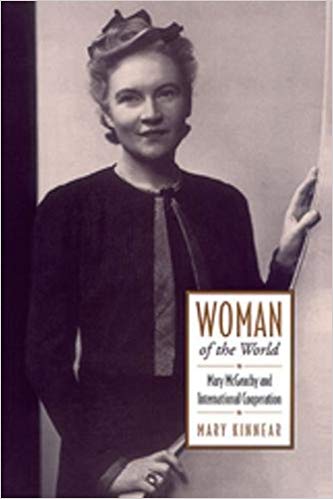

 Mary Agney Craig McGeachy (November 7, 1901 - November 2, 1991) was the first woman
British Diplomat in 1942.
Mary Agney Craig McGeachy (November 7, 1901 - November 2, 1991) was the first woman
British Diplomat in 1942.
Born on the 7th of November 1901 in Sarnia, Canada, Mary McGeachy was an international civil servant for the League of Nations who moved to working for the UN Relief and Rehabilitation Administration after the war. She was also the first woman to gain British diplomatic status as First secretary to the British embassy in Washington in 1942, as well as President of the Woman’s International Council from 1963 to 1973.
Mary McGeachy studied History and English Literature at the University of Toronto. Her father was a pastor, and she grew up in a very religious, middle-class Protestant family. Her attachment to religion followed her throughout her life. She became an active member of the International Christian student Movement at university, which helped nurture her interest for internationalism. After she graduated, she became a high school history teacher in Hamilton, Canada.
After taking part in several conferences around Europe, she moved to Geneva in 1927, where she shared an apartment on the Place du Bourg de Four. There, she worked as a writer for the newspaper Vox Studentium, but dreamt of working for the League of Nations. She joined the organisation in 1928, and became responsible for communications between the League of Nations and international feminine organisations. In 1940, she left Geneva. During the war, she helped several of her colleagues, and herself, reach the United States by driving through France and Spain, finally reaching Portugal and catching a boat to New York. Upon arrival, she was recruited by the British Ministry of Economic Warfare and became the First secretary to the British Embassy. In 1942, she became the first woman to receive British Diplomatic status - but, unlike her male counterparts, this was only on a temporary basis.
She married in 1944 and chose to keep her maiden name, McGeachy. That same year, she became Director of the social protection department of the UN Relief and Rehabilitation Administration. This particular branch of the new organisation of the UN aimed to organise Europe’s reconstruction after the War. In 1946, Mary McGeachy retired, adopted two children and dedicated herself to her family for over ten year, living between the US, South Africa and Canada.
Following her husband’s suicide in 1963, she became President of the International Council of Women - which was an unpaid position - until 1973. According to her biographer, Mary McGeachy did not feel comfortable being defined as a feminist, and during her presidency, found it difficult to identify with the demands of the new generations who were marching for sexual liberation. She was made a Lady of the Order of Saint John in 1986, and died in 1991 in New York.
My published books: